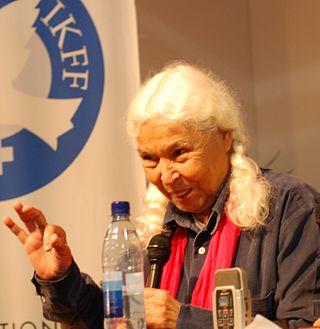
"Maggie Out" was a chant popular during the miners' strike, student grant protests, poll tax protests and other public demonstrations that fell within the time when Margaret Thatcher was the Prime Minister of the United Kingdom.

Nawal El Moutawakel is a Moroccan former hurdler, who won the inaugural women's 400 metres hurdles event at the 1984 Summer Olympics, and is the first Moroccan, Arab, African, and Muslim woman to win an Olympic gold. In 2007, El Moutawakel was named the Minister of Sports in the upcoming cabinet of Morocco.
Shia Islam is the second-largest branch of Islam. It holds that the Islamic prophet Muhammad designated Ali ibn Abi Talib (656–661 CE) as his successor as Imam, most notably at the event of Ghadir Khumm, but that after Muhammad's death, Ali was prevented from succeeding as leader of the Muslims as a result of the choice made by some of Muhammad's other companions at Saqifah. This view primarily contrasts with that of Sunni Islam, whose adherents believe that Muhammad did not appoint a successor before his death and consider Abu Bakr, who was appointed caliph by a group of Muhammad's other companions at Saqifah, to be the first Rashidun ('rightful') caliph after Muhammad (632–634 CE).

Woman at Point Zero is a novel by Nawal El Saadawi written in 1975 and published in Arabic in 1977. The novel is based on Saadawi's meeting with a female prisoner in Qanatir Prison and is the first-person account of Firdaus, a murderess who has agreed to tell her life story before her execution. The novel explores the themes of women and their place within a patriarchal society.

Fatimah Rifaat, better known by her pen name Alifa Rifaat, was an Egyptian author whose controversial short stories are renowned for their depictions of the dynamics of female sexuality, relationships, and loss in rural Egyptian culture. While taking on such controversial subjects, Fatimah Rifaat's protagonists remained religiously faithful with passive feelings towards their fate. Her stories did not attempt to undermine the patriarchal system; rather they were used to depict the problems inherent in a patriarchal society when men do not adhere to their religious teachings that advocate for the kind treatment of women. Fatimah Rifaat used the pseudonym Alifa to prevent embarrassment on the part of her family due to the themes of her stories and her writing career.
Gender roles in Islam are based on scriptures, cultural traditions, and jurisprudence.

The Jamaraat Bridge is a pedestrian bridge in Mina, Saudi Arabia, near Makkah used by Muslims during the Hajj ritual Stoning of the Devil. The purpose of the bridge is to enable pilgrims to throw stones at the three jamrah pillars either from the ground level or from the bridge. Jamaraat is the plural of jamraah, the Arabic term for each of the pillars involved in the stoning ritual. It literally means a small piece of stone or a pebble.
Ny Tid is Norway's largest international quarterly review of non-fiction books – up to 50 in each issue. It is currently owned by Ny Tid & Orientering AS.

Dag Herbjørnsrud is a historian of ideas, author, a former editor-in-chief, and a founder of Center for Global and Comparative History of Ideas in Oslo. His writings have been published by Aeon, the American Philosophical Association (APA), Dialogue and Universalism, Cosmopolis, etc., and he was formerly a columnist for Al Jazeera English. Herbjørnsrud was the guest editor of a special issue of the bilingual journal Cosmopolis (Brussels), on "Decolonizing the Academy"; one of his contributors was the author and Professor Ngũgĩ wa Thiong'o. He sits on the Editorial Review Board of the book series Global Epistemics at Rowman & Littlefield.

Zed Books is a non-fiction publishing company based in London, UK. It was founded in 1977 under the name Zed Press by Roger van Zwanenberg.

Nawal El Saadawi was an Egyptian feminist writer, activist and physician. She wrote numerous books on the subject of women in Islam, focusing on the practice of female genital mutilation in her society. She was described as "the Simone de Beauvoir of the Arab World", and as "Egypt's most radical woman".
Osman Nusairi is a playwright and award-winning translator of Sudanese origin. He has translated two Arabic novels into English - Nawal el-Saadawi's Two Women in One and Reem Bassiouney's The Pistachio Seller (2009). The latter work won the Arkansas Arabic Translation Award in 2009.
Marilyn Louise Booth is an author, scholar and translator of Arabic literature. Since 2015, she has been the Khalid bin Abdullah Al Saud Professor for the Study of the Contemporary Arab World at the University of Oxford and a Fellow of Magdalen College, Oxford.

Irreligion in Egypt is controversial due to the prominence of conservative social traditions and the persecution by the religious institutions in the country. It is difficult to quantify the number of atheists or agnostics in Egypt, as the stigma attached to being one makes it hard for irreligious Egyptians to publicly profess their views and beliefs.
Nawal or Nawaal is Arabic female given name literally meaning "unmerited favour of God" or "gift, grant, present, donation, award, offering" or also could mean "state or quality of being kind, act of kindness beyond what is due" or "grace, kindness, favour, charity". The name is actually an infinitive form of the adjective which stems from verb نَالَ nāla, meaning "to accomplish, achieve, earn, gain, receive
Fedwa Malti-Douglas is a Lebanese-American professor and writer. She is a professor emeritus at Indiana University Bloomington. Malti-Douglas has written several books, including The Starr Report Disrobed (2000). She received a National Humanities Medal in 2015.
Events in the year 2021 in Egypt.

Namina Forna is a Sierra Leonean American author of young adult fiction and a screenwriter. Her debut novel The Gilded Ones was published in February 2021 and quickly entered the New York Times and Indie Bestseller lists.
Events in the year 1931 in Egypt.









